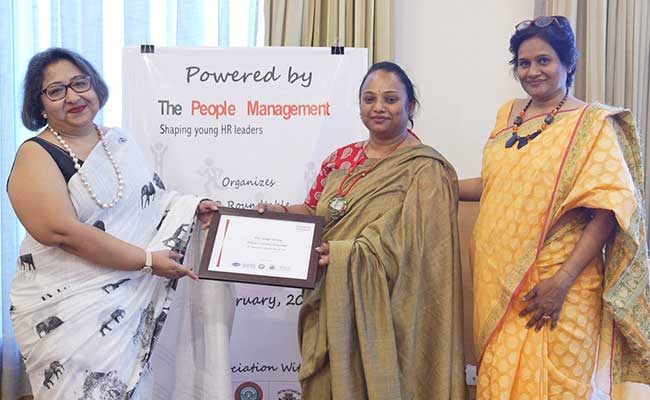The People Management HR Events 2023

The HR Roundtable was focus on:
i) Moonlighting
ii) Great Resignation, Quiet Quitting, Layoffs-Boon or Bane?

Eminent speakers from leading organisations such as Mr Abhay Kapoor, CHRO, Suzuki Motors Gujarat Pvt. Ltd, Ms Rita Misra, HR Head, Tata Realty, Ms Padma Singh, Sr. Vice President- OD and L&D, BSES Rajdhani Power Limited, Ms Jayanthi Jagannath, CHRO, K&S Partners, Mr Shripal Shah, Managing Partner, Meshlinks Consulting, Ms Shayantani Sen, Executive Director – Organization Behaviour, Judge India Solutions, Reshmi Dey, Director HR, Judge India Solutions, Sanjay Kapoor, Chief Operating Officer, Interra Information Technologies, Mr Ashok Thussu, Director, LMI-India.
All the Eminent Speakers were welcomed and addressed by Aparna Sharma, Consulting editor of The People Management. The eminent speakers of the session shared their valuable corporate experience and thoughts on what HR and Business Managers should do together for betterment of the Company.
Mr Abhay Kapoor said correctly that the concept of moonlighting is not a new. It is happening everywhere except factory. He further advised HR Fraternity that if organisations cannot avoid, it is only how this can bring in the framework in HR System to legitimate it.

Dr Tapash Dey mentioned that during covid, employees had to face salary cut or without salary. Hence people were forced to do moonlighting. He explained on Great resignations and quite quitting that Line mangers or Front line people should be developed. Further he advised HR to engage employees is the best solution to stop moonlighting.
Ms Rita Mitra agrees that the major reason behind moonlighting is money. She agrees that quit quitting is happening because Job security psychology factor is no longer now in the employees. She further explained that it is about how to deal with conflict of interest.

Ms Padma Singh (Sr. Vice President- OD and L&D, BSES Rajdhani Power Limited) commented that being a phenomenon, mainly in IT sector, it is unethical and if at all Organizations want to accept or encourage this considering the fact that its helping in the upskilling of the IT employees through the Projects undertaken by them, Organization’s need to come up with a defined policy on this. Moonlighting, if not structured and addressed adequately, may also lead to productivity issues of such employees. She futher advised on quiet quitting that organizations need to enhance people connect and energize the employees through various engagement activities, Reward and Recognition. May not be good in long term for both employees and organization. However, people connect, personalized exit interviews, open and transparent communication, townhall, coffee meets should be able to address the Great Resignation.
Ms Jayanthi Jagannath explained about her organization’s “Voice Sensing Exercise” in batches – a brain storming and employee engaging exercise. Further she explained on quite quitting that the participation of Senior Leaders is very important to engage employees in the organisation.
Mr Ashok Thussu agrees that primary factor for moonlighting is to make more money. Need to figure out better ways to come to terms with the work from home or hybrid model. Further he mentioned that the great resignation, quit quitting came quickly after covid because market is open and demand is more.
Ms Kavita Mitra mentioned about one survey whereas 80% employees falling quit quitting population and 15% extra mile and working. It is all about mind set to perceive these population.
Ms Shayantani Sen agrees that Trust is the Pillar. HR cannot control everything.
Mr Hemanth Mundra shared his experience that due to demand of talent, company is paying people more and reducing margin in profits. He also said that disengaged employees are quit quitting.
Ms Aarti Kohli pointed out that employment scenario is changing however laws are not keeping up accordingly and is a great mismatch. She further advised that that “Conflict of Interest Declaration” can be included for better understanding between employee and employer.
Mr Sanjay Kapoor says Organisations must think about good financial arrangement to retain employees. Secondly Team building, engaging employees are very important.
Mr Shripal Shah gave three reasons for moonlighting : 1) to earn more money 2) Non- availability of better financial arrangements for employees 3) talent crunch
Ms Sonali Jain explained that Trusting your employee is very important. Since technology is there, employees are aware of their limitations too.
Ms Gayatri Kriplani clarifies that moonlighting is already there but became more popular during Covid time. Secondly, Gen Z is keen to earn more money
Mr Darshan Vyas explained examples of moonlighters ie: graphic designers etc. He further said that quite quitting started after covid when companies asked employees to come back to office to work.
Ms Ruvalma Fernandes said organisation’s culture plays a crucial role.
Ms Neha Chauhan agrees that healthcare sector is also facing great resignation after covid because of options available in market.
Ms Reshmi Dey explained that great resignation is happening because people have multiple opportunities in the market.
Dr. Priyambada Purohit used terminology on half moonlighting, quarter moonlighting and full moonlighting and moreover focussed on the situation if it is problematic or manageable.
Mr Vijay Kumar agrees that expression of potential is a primary and money is secondary aspect for moonlighting.
After mind blowing session and debate on moonlighting, great resignation and quite quitting has touched upon several aspects including ethics, some leaders commented that moonlighting is unacceptable and unethical and on other side some leaders have found a way to accept it. However on great resignation and quit quitting, most of the leaders agreed that this happening after covid because people have multiple options and opportunities in market. The best practice to stop moonlighting and quit quitting is to engage employees, create path to move forward within the organization and participation of Senior Leaders.



